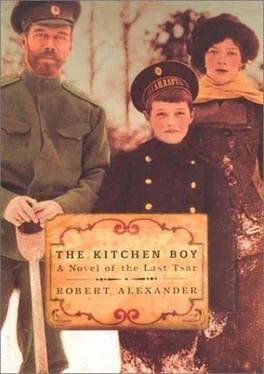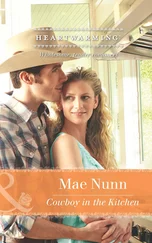So the inspection that morning was a somber affair. The only visible sign of stress among the family were Aleksandra’s eyes, which were swollen red, and her pale skin, which was all blotchy. But while she was deeply disturbed that morning, perhaps deathly afraid, she would not betray herself, she would not allow her captors that victory not simply over her persona, but most importantly over her faith in the greater glory of Bog . God. She knew as well that she had to be strong for her children, the children whom she had always tried to raise properly so that they would not folly in their wealth and exulted status. To them she wrote:
Learn to make others happy, think of yourself last of all. Be gentle and kind, never rough nor rude… Show a loving heart. Above all, learn to love God with all the force of your soul and He will be near you… Your old Mama
Standing according to our rank, from Tsar to Tsaritsa, Heir to grand duchesses, then all the way from doctor, maid, and down to me, the lowest of all, that morning inspection was the most somber of any to take place in The House of Special Purpose. We stood in the dining room, in front of the large fireplace, all of us seething with rage and fear, but none of us saying a word, because we took our every cue from the Emperor and Empress. When they crossed themselves during a church service, so did we. When they dropped to their knees and bowed their foreheads to the floor, so did we. And that morning, during that inspection, both Nikolai and Aleksandra stood ramrod straight, their lips pinched tight like a champagne cork holding all within lest all explode. And so did we.
“Noo… noo …” Well… well… mumbled Avdeyev, looking us up and down.
Big and heavy was he, his hair a mess, his face unshaved. Actually his eyes were red as well, though certainly not from crying. Nyet , we knew there had been much drinking last night, for there’d been so much shouting, so much hooting and singing. And that was surely when the drawings had been made on the walls of the water closet.
“So…” began Avdeyev, his voice all coy, obviously fishing for some kind of reaction to the drawing and the ditty, “any questions, any problems?”
“Nyet-s, Aleksander Dimitrievich,” respectfully replied the Tsar.
Avdeyev stared long and hard into Nikolai Aleksandrovich’s face. One of the guards across the room openly laughed, and Avdeyev’s bloated lips swelled into a puffy, purple smile.
“Neechevo?” Nothing? “Really? No questions of any sort?”
I glanced over, saw the Tsar’s face bloom crimson, noted his chin begin to quiver. Was this it? Had the Tsar reached the end? Could he, would he, burst with this last teeny bit of needling? And if so, if he fell, what did that mean for the rest of us? What hope would there be?
“Nyet-s, voprosov nikakix.” No, there are no questions, tersely said the Tsar, holding his head as well as his voice steady, good soldier that he was.
Avdeyev shrugged and turned away, saying, “Very well, then go ahead and have your morning tea.”
Groaning and rubbing his head, the komendant lumbered off, making his way back to the main guard room on this level, where, I imagine, he laid back down and went to sleep for a good long while.
Meanwhile, cook Kharitonov and I prepared the tea, which was served in the dining room. Black tea, black bread, and a bit of butter. They all sat down – the seven Romanovs, Dr. Botkin, and only reluctantly, only after all the others had taken their seats, Demidova and Trupp. Sure, cook and I brought everything out to the table and sat down as well. That morning we were short just three things, two teaspoons and one butter knife, so the cutlery went around the table. But it went around in silence, for hardly a word was spoken during the meager repast.
Immediately after breakfast Nikolai Aleksandrovich retired with his son to the drawing room, where they sat with Dr. Botkin, who, though much improved, was still weak from his attack of the kidneys. In his beautiful voice, so clear, so resonant, the Tsar read aloud, as was his frequent custom, and that morning he read to his son and his friend, Botkin, the twelfth volume of Saltykov, Poshekhonskaya starina , The Old Days of Poshekhonye. And soon the work of Russia’s richest satirical writer – this one poking fun at the old landed gentry and bureaucrats alike – began to lift the morose cloud, filling the rooms of the Ipatiev House with small, but such significant peals of laughter.
And the womenfolk?
All morning they “arranged things.” Aleksandra, her maid, and four daughters worked more furiously than ever, sewing secretively in near-constant shifts. I suppose given the notes we had already received and the very real possibility that we might at any moment have to flee, it seemed the only wise course. So Aleksandra disappeared into her bedroom, where in the heat of the summer she sewed away. A few minutes later Olga Nikolaevna went to assist her, an hour later Demidova, and so on.
Thus passed that painful morning, each of us in our own way trying to comprehend what lay ahead of us. Never, however, did I imagine so dark an event as would take place. Then again such a thing as a chistka – a cleansing, a liquidation – was a new concept, one that would be played like a black refrain throughout the history of the Soviet Union.
It was approaching the noon hour when a great Slava Bogu rose like a Gregorian chant. Yes, we all gave thanks to God when at midday Sister Antonina and Novice Marina came, bringing with them precious foodstuffs, including another priceless chetvert of milk. Cook Kharitonov and I were both in the kitchen when the visitors came, and again it was I, the kitchen boy, who received the goods from the sister.
“Dobryi dyen, my sons.” Good day, said Sister Antonina, her stout little figure draped in black as always.
“Dobryi dyen, sestra,” I replied.
“With pleasure and by the grace of God Himself,” she said, handing me a basket in which were nestled some eggs, “we humbly offer a simple token.”
Kharitonov, who was boiling some water on the little oil stove, wiped his beaded brow, and said, “Ah, it is the good sisters of the world who keep our bellies full.”
“Of course. Our chickens are our pride. And we have such good cows, such fresh grass as well. The novice Marina here,” Sister Antonina said, indicating her shy, young apprentice, “is a very able milkmaid, isn’t that right, dorogaya ?”
Marina was dressed not as rigorously in black, for I could see waves of rich brown hair beneath her headpiece, not to mention her ankles at the base of her black frock. And she just stood there, her head bowed, saying nothing. Instead, she merely blushed the color of a summer sunrise as she carefully placed a glass bottle of milk on the wooden table.
“And today,” continued Sister Antonina, “we have not only more milk and such nice fresh eggs for The Little One, but some cheese from our caverns as well.”
“They are greatly appreciated,” I replied.
“This I know.”
I studied the sister’s apple-wrinkled face, which was so darkly and tightly swathed by the black wimple of her order, and saw that her cheeks and nose were red and swollen with the heat of the day. Tiny droplets of moisture glistened on the surface of what little of her skin was showing, and my eyes traveled to her eyes, linking us in silent communication. Her long gaze, punctuated by one double blink, telegraphed all that could not be said.
Suddenly a guard appeared in the doorway, gun over his right shoulder, grenade on his belt. It was not the blond guard, but the beardless one with dark hair.
Читать дальше












